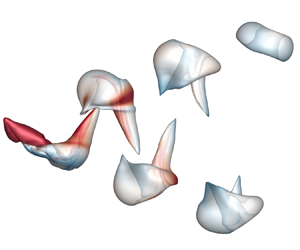Crossref Citations
This article has been cited by the following publications. This list is generated based on data provided by
Crossref.
Tao, Rui
Ren, Hongxiang
Tong, Yunjin
and
Xiong, Shiying
2021.
Construction and evolution of knotted vortex tubes in incompressible Schrödinger flow.
Physics of Fluids,
Vol. 33,
Issue. 7,
Wang, Chunyu
Xu, Zhaoyue
Zhang, Xinlei
and
Wang, Shizhao
2021.
Optimal reduced frequency for the power efficiency of a flat plate gliding with spanwise oscillations.
Physics of Fluids,
Vol. 33,
Issue. 11,
Zhang, Dong
Huang, Qiao-Gao
Pan, Guang
Yang, Li-Ming
and
Huang, Wei-Xi
2022.
Vortex dynamics and hydrodynamic performance enhancement mechanism in batoid fish oscillatory swimming.
Journal of Fluid Mechanics,
Vol. 930,
Issue. ,
Tong, Wenwen
Wang, Shizhao
and
Yang, Yue
2022.
Estimating forces from cross-sectional data in the wake of flows past a plate using theoretical and data-driven models.
Physics of Fluids,
Vol. 34,
Issue. 11,
Huang, Xiao-Ting
Sun, Peng-Nan
Lyu, Hong-Guan
and
Zhang, A-Man
2022.
Numerical investigations on bionic propulsion problems using the multi-resolution Delta-plus SPH model.
European Journal of Mechanics - B/Fluids,
Vol. 95,
Issue. ,
p.
106.
Wang, Zhengdong
Li, Linmin
Li, Xiaojun
and
Zhu, Zuchao
2022.
Large eddy simulation of cavitating flow around a twist hydrofoil and investigation on force element evolution using a multiscale cavitation model.
Physics of Fluids,
Vol. 34,
Issue. 2,
Yin, Guang
Janocha, Marek Jan
and
Ong, Muk Chen
2022.
Estimation of Hydrodynamic Forces on Cylinders Undergoing Flow-Induced Vibrations Based on Modal Analysis.
Journal of Offshore Mechanics and Arctic Engineering,
Vol. 144,
Issue. 6,
Wang, Chengyue
Shen, Yunian
Mang, Shanshan
Gao, Qi
Wang, Zhongyi
and
Wang, Jinjun
2022.
A novel algorithm for visualizing and quantifying vortices in complex 3D flows based on marching and converging vortex atoms.
Physics of Fluids,
Vol. 34,
Issue. 11,
Kang, Linlin
Xiong, Shiying
Wu, Buchen
Li, Chao
Ge, Mingming
Yuan, Dehan
Han, Fei
and
Cui, Weicheng
2023.
Force decomposition on flapping flexible plate via impulse theory and dynamic mode decomposition.
Physics of Fluids,
Vol. 35,
Issue. 10,
Yang, Yue
Xiong, Shiying
and
Lu, Zhen
2023.
Applications of the vortex-surface field to flow visualization, modelling and simulation.
Flow,
Vol. 3,
Issue. ,
Li, Zhen-Yao
Feng, Li-Hao
Wang, Tong
and
Liang, Yan
2023.
Lift generation mechanism of the leading-edge vortex for an unsteady plate.
Journal of Fluid Mechanics,
Vol. 972,
Issue. ,
Wang, Zhengdong
Li, Linmin
Li, Xiaojun
Yang, Chunye
and
Zhu, Zuchao
2023.
Cavitation Evolution Around a Twist Hydrofoil by Large Eddy Simulation (LES) with Mesh Adaption.
Journal of Ocean University of China,
Vol. 22,
Issue. 3,
p.
627.
Liu, Zhifeng
and
Yang, Yue
2023.
Construction of the vortex-surface field from tomographic particle image velocimetry data of flow past a vortex generator.
Experiments in Fluids,
Vol. 64,
Issue. 6,
Lin, Jianfeng
Wang, Shizhao
Yao, Hua-Dong
and
Su, Yumin
2024.
Hydrodynamic response of swinging or slewing rotating cylinders subject to a ship's rolling motion.
Physics of Fluids,
Vol. 36,
Issue. 6,
Lin, Jianfeng
Wang, Shizhao
Yao, Hua-Dong
and
Su, Yumin
2024.
Angle of attack impact on flow characteristics around finite-length rotating columns.
Physics of Fluids,
Vol. 36,
Issue. 6,
Shen, Huan
Cao, Kai
Liu, Chao
Mao, Zhiyuan
Li, Qian
Han, Qingfei
Sun, Yi
Yang, Zhikang
Xu, Youzhi
Wu, Shutao
Xu, Jiajun
and
Ji, Aihong
2024.
Kinematics and Flow Field Analysis of Allomyrina dichotoma Flight.
Biomimetics,
Vol. 9,
Issue. 12,
p.
777.
Liu, Hao
Wang, Shizhao
and
Liu, Tianshu
2024.
Vortices and Forces in Biological Flight: Insects, Birds, and Bats.
Annual Review of Fluid Mechanics,
Vol. 56,
Issue. 1,
p.
147.
Liu, Zhifeng
and
Yang, Yue
2024.
Open-jet facility for bio-inspired micro-air-vehicle flight experiment at low speed and high turbulence intensity.
Advances in Aerodynamics,
Vol. 6,
Issue. 1,
Johansson, L. Christoffer
2024.
Aerodynamic efficiency explains flapping strategies used by birds.
Proceedings of the National Academy of Sciences,
Vol. 121,
Issue. 46,
Chen, Yixin
Liu, Yi
and
Wang, Shizhao
2025.
Streamwise ram effect and tip vortex enhance the lift of a butterfly-inspired flapping wing.
Journal of Fluid Mechanics,
Vol. 1005,
Issue. ,




